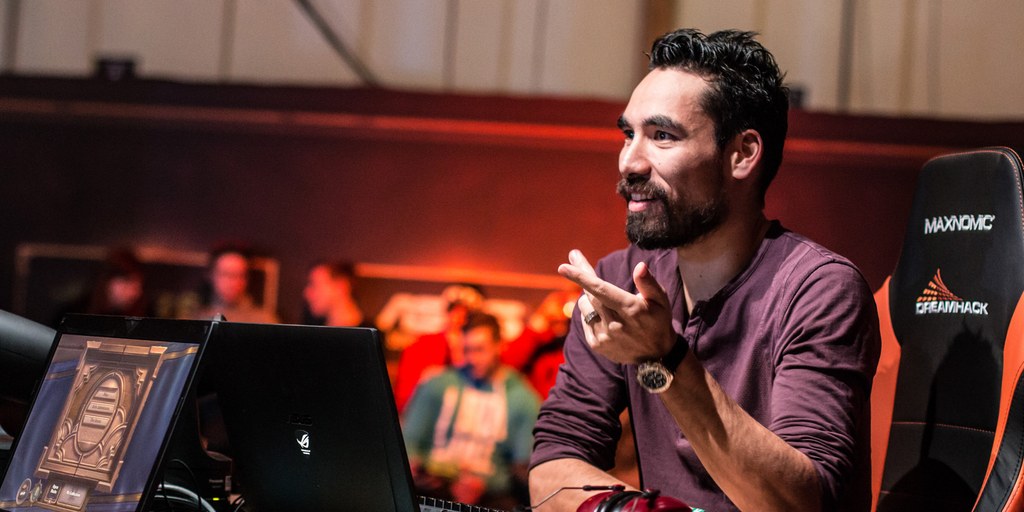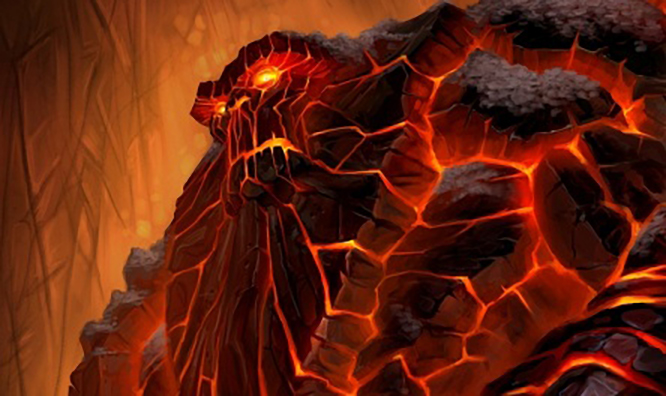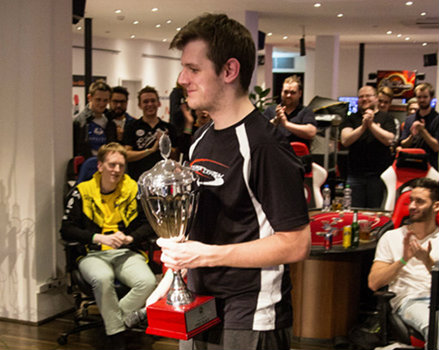
The decision by Adrian “Lifecoach” Koy to stop playing Hearthstone competitively was a significant blow to Blizzard’s game, which already struggles to be taken seriously as an esport. Citing his frustration with RNG and the dominance of aggro decks, Lifecoach announced in a video that he would no longer be grinding Hearthstone’s ranked ladder or competing in tournaments for World Championship Tour points, though he may still participate in fun invitational events.
That switch came off the back of an intense period in which, alongside his protege and training partner Jan “SuperJJ” Janssen, Lifecoach took a boot camp approach to practicing in a bid to see how it would improve results. Over the course of marathon daily Twitch streams from Lifecoach’s lavish Vienna gaming room, which looks more like the office of a kindly Bond villain, the pair played high-level Hearthstone with a dedication not seen before, and unlikely to be replicated again. Until finally they had both had enough.
Losing Lifecoach matters, because along with Kolento and more recently Pavel, he has been one of the few players to succeed anything like consistently at tournaments. His career speaks for itself, boasting multiple major wins, plus success as the de facto leader of the dominant G2 Team that also includes Thijs and Rdu.
I caught up with Lifecoach last week to ask him if he’s really done with competitive Hearthstone. We also touched on the problem with aggro, his favourite Hearthstone era, why he used to stream topless, and whether his poker winnings mean he really doesn’t have to work again.
PC Gamer: The big news is that you're finished with competitive Hearthstone. Is that correct?
Adrian "Lifecoach" Koy: Yeah, more or less. I don't play the ladder anymore. It's not that I'm finished with competitive Hearthstone, it's that I think there is no more real competitive Hearthstone, and that's why I'm finished. I would love to play competitive Hearthstone, that's not the issue.
Was there an exact moment when that decision crystallized?
The biggest gaming news, reviews and hardware deals
Keep up to date with the most important stories and the best deals, as picked by the PC Gamer team.
Not an exact moment, but continuously over the last one and a half years. Over that time, things were not exactly perfect in the game from a competitive view. Blizzard has been made aware of those problems in various different posts, but it just seems that the company is not interested in changing things in favor for the competitive scene. Rather, it’s the opposite. I've talked about it before, with the nerfs to things like Molten Giant, Blade Flurry, and Warsong Commander—they tend to nerf very skill-heavy decks that reward high skill caps, and on the other hand try to make the game easier to understand and more accessible for the broad masses. It's not necessarily a problem itself, but it seems to me that the development goes absolutely against the pro scene.
And at the moment, talking about competitive Hearthstone, the question is always when can you call a game competitive? If you can achieve a 1% edge, then it's kind of coin-flipping. So I think there's no disagreement in that if you have a game, and the best players of the world can only play at 1% better than an average player, then it's a pure gamble and it really has nothing to do with competitiveness at all. And while I'm not saying that Hearthstone is at 1% at the moment, [the percentage] is way too low.
The world's best player can probably have a 5% edge over a good player per game, at the moment, which is ridiculously low. That also reflects the low skill cap. Games are very short, so there are very few opportunities to even display skill, because the first few turns are the most simple. You have no resources on the board whatsoever, you have only a few Mana to interact with, and also not a big combination of cards to pick from. So there are not many places to make mistakes, and the edge vanishes.

Did this feeling creep up on you? Why choose to quit playing competitively now?
In terms of game-winning percentage, a world class player had a 70% chance to win against a legend-quality player a year or so ago. Not true anymore. Nowadays you have at max maybe 62 or 63%. Sometimes there are little spikes, if you have an upswing, but if you take upswings out, the edge probably halves, which is tremendous in terms of any kind of measurement.
Are there particular cards or mechanics which you think have exacerbated the problem recently?
Obviously Patches accelerates the game itself, so it shortens the game length by two or three turns on average. That means if an average game would have lasted until turn 8 or 9 on average, that's turn 7 now. So it's going in the same direction I described before.
Have you had any conversations with Blizzard about your concerns?
[Blizzard] care very much for the casual player experience, but not much for the competitive player.
Adrian "Lifecoach" Koy
Sure, but it would be a little unfair to say. Of course I pointed out specifically Patches, but that might make it sound like they don't care about these concerns. From my understanding the expansions usually go into a phase of polishing that lasts several months, and in this phase changes cannot really be applied. I'm not saying that this is good, I think it's a bad thing, but it means at the point where I expressed my concerns—kind of obvious concerns, in my opinion—they basically pointed out it's too late for changes.
Do you think there could be anything in the Journey to Un’Goro expansion that might lure you back to playing competitively.
I already know what is in the expansion, but it probably won't influence my decision. [Lifecoach explained he’d been given a preview of some of the cards by Blizzard, but couldn’t discuss specifics—Ed.] I just believe the game is going in the wrong direction and until I see that there is real effort in order to improve the competitive scene, or just some advantages for the competitive scene, I won't change this opinion, which is basically that they care very much for the casual player experience, but not much for the competitive player.
Looking back, which era of Hearthstone was its healthiest?
It's difficult to say. Obviously I enjoyed many things. Whenever there was a skill-heavy deck, I enjoyed it very much. It began with Sunshine Hunter, which unfortunately was nerfed. Then, after that, I enjoyed Miracle Rogue and Miracle Druid. They had very high skill caps and high win percentage, but unfortunately those decks became nerfed. The next deck I really enjoyed was playing Handlock—that was my signature deck. But that was nerfed with the Molten Giants, but it was already not that strong any longer. And of course Patron Warrior. Patron I spent many hours playing, but of course that was nerfed too.
You hear what I'm talking about. Yes, they were arguably the strongest decks—not always, but usually yes—but only if you knew how to play those decks very well. It's not a coincidence that in the past I decided play the most skill-heavy decks, which when you played well gave the highest win percentages. Seeing that all of them got nerfed eventually, it's frustrating.
Over time, you see that if you really spend the effort, you don't get rewarded—it's the opposite, you get punched in the face. It's not rewarding from a competitive aspect. Just imagine—to draw a direct comparison—you're a League of Legends player, and you maximize some output with a very specific hero, and then suddenly your signature hero becomes nerfed. Whatever you want to take as a comparison, it's very frustrating.
You and Jan “SuperJJ” Janssen took a boot camp approach to practicing and ladder grinding. Wasn’t there always a danger that with this aggressive approach you’d burn yourselves out?

“Adrian was the one got me into professional Hearthstone in the first place. Back in the day, he flew me into Vienna and showed me how he’s playing. I didn’t even know it was possible to go pro. Afterwards I went home and just played like crazy for a year. At some point eventually the breakthrough happened. Then we said let’s make a boot camp.
I moved to Vienna because I got along with him very well. It wasn’t that weird. It was actually very happy, because I like doing things in a way—especially for a game like Hearthstone—without being limited. It’s so valuable for people like us.”
That’s something I’ve seen suggested, but if you follow my vlog or Twitch channel you’ll know why we did it. The origin of the boot camp was that we both got a little frustrated with the game and were thinking about quitting. We are people who usually do things with all our heart, and all our time. Maximum effort or we just don’t do them at all. We both just have a very competitive nature. So we were thinking about quitting Hearthstone, but we also loved Hearthstone and had a lot of positive associations with it. So we said, okay, maybe we are wrong and we don’t play the game enough to absolutely reach our skill ceiling. And maybe if we spend 100 hours a week in the game, we’ll see things which we don’t at the moment.
It sounds like you were giving Hearthstone one final chance, by approaching as a team might in a game like League of Legends, and seeing what impact that kind of practice had. And I guess the results proved your point, which was that there wasn’t enough difference between world class players and typical legend rank ones.
Exactly, exactly. So we spent 100 hours per week for roughly two and half months, basically 1,000 hours of gameplay and practice. It wasn’t only gameplay—in the non-streaming hours we also talked about strategy, picked the strongest meta decks, and took some decks like the Jade Shaman into the meta. It was a very high level of gameplay, in my opinion, and the results were actually very good. We finished between top 10 and top 50 in legend rank every season, so from that aspect it was pretty cool. But taking a look at the win percentages it was not that rewarding. We had 62.5% on average in high legend, compared with the 60.5% we had before—so a mere increase of 2%.
We realised how ridiculous the system is, in that it rewards hard grinding. The more games you play, the more reward you get. Skill doesn't really matter. It's quantity over quality. As people who are striving for perfection, that’s actually a really bad thing. It's not about who's playing the best, it's basically about who’s playing the most. I mean, obviously you still have to play well, but quantity weighs way more than quality in this system.
On the next page: Hearthstone's fundamental problems, the potential of Gwent, and how Lifecoach made his millions...
With over two decades covering videogames, Tim has been there from the beginning. In his case, that meant playing Elite in 'co-op' on a BBC Micro (one player uses the movement keys, the other shoots) until his parents finally caved and bought an Amstrad CPC 6128. These days, when not steering the good ship PC Gamer, Tim spends his time complaining that all Priest mains in Hearthstone are degenerates and raiding in Destiny 2. He's almost certainly doing one of these right now.


